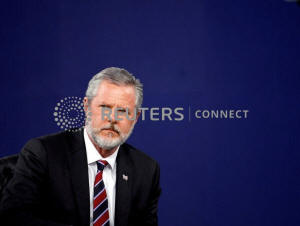Exclusive: Falwell steered Liberty University land deal benefiting his
personal trainer
 Send a link to a friend
Send a link to a friend
 [August 28, 2019]
By Aram Roston and Joshua Schneyer [August 28, 2019]
By Aram Roston and Joshua Schneyer
LYNCHBURG, Va. (Reuters) - Evangelical
leader and prominent Donald Trump backer Jerry Falwell Jr personally
approved real estate transactions by his nonprofit Christian university
that helped his personal fitness trainer obtain valuable university
property, according to real estate records, internal university emails
and interviews.
Around 2011, Falwell, president of Liberty University in Virginia, and
his wife, Rebecca, began personal fitness training sessions with
Benjamin Crosswhite, then a 23-year-old recent Liberty graduate. Now,
after a series of university real estate transactions signed by Falwell,
Crosswhite owns a sprawling 18-acre racquet sports and fitness facility
on former Liberty property. Last year, a local bank approved a line of
credit allowing Crosswhite's business to borrow as much as $2 million
against the property.
Falwell, one of the most influential right-wing Christian leaders in the
United States, has been buffeted by disclosures about his private
dealings over the last year and a half.
A Florida lawsuit brought public scrutiny to a relationship between the
Falwells and Giancarlo Granda, a young man they befriended while he was
working as a pool attendant at a luxury Miami Beach hotel and later
backed in a business venture involving a youth hostel. Falwell filed an
affidavit in 2018 saying he used his own wealth to lend $1.8 million to
the $4.65 million project with Granda.

And U.S. President Trump’s now-jailed fixer, Michael Cohen, has said he
helped the Falwells suppress racy personal photos, as Reuters reported
this May, in the months before Cohen persuaded Falwell to endorse
Trump’s 2016 White House bid. There is no evidence that Cohen’s efforts
to suppress the photos were a quid pro quo for Falwell’s vital political
backing.
The support Falwell provided to the two young men, Granda and Crosswhite,
has some parallels. Both were aided in business ventures and both have
flown on the nonprofit university’s corporate jet.
One difference: When Falwell helped Crosswhite, he used the assets of
Liberty, the tax-exempt university he has led since 2008. Among the
largest Christian universities in the world, Liberty depends on hundreds
of millions of dollars its students receive in federally backed student
loans and Pell grants.
In 2016, Falwell signed a real estate deal transferring the sports
facility, complete with tennis courts and a fitness center owned by
Liberty, to Crosswhite. Under the terms, Crosswhite wasn’t required to
put any of his own money down toward the purchase price, a confidential
sales contract obtained by Reuters shows.
Liberty committed nearly $650,000 up front to lease back tennis courts
from Crosswhite at the site for nine years. The school also offered
Crosswhite financing, at a low 3% interest rate, to cover the rest of
the $1.2 million transaction, the contract shows.
Crosswhite declined to answer questions about the deal. "All I will say
is that my wife and I consult each other before every major business
deal and we bought the complex from Liberty together," he said in an
email. "My wife and I both work around the clock to make our business
succeed."
Falwell referred Reuters to the university for comment. Liberty issued a
statement describing the transaction as both proper and beneficial for
the school.

Liberty had received the athletic center as a gift in 2011 from a
trustee who has since died, but it quickly became a “drain on university
resources,” the statement said. Crosswhite had been leasing gym space at
the property since 2013, and was thus “the most viable purchaser.”
Liberty said it adjusted the price and financed Crosswhite’s purchase
because its tennis team would continue to use the courts.
Falwell has “tried to be a business mentor” to Crosswhite, the
university statement said, but that effort did not “cause him to abandon
his fiduciary duties” to Liberty.
As Liberty’s leader, Falwell draws an annual salary of nearly $1
million, and is obligated to put the university’s financial interests
before his own personal interests when conducting Liberty business.
“The concern is whether the university’s president wanted to do his
personal trainer a favor and used Liberty assets to do it,” said Douglas
Anderson, a governance specialist and former internal audit chief at Dow
Chemical Co, who reviewed both the transaction and Liberty's explanation
of it at Reuters’ request. That would be bad governance, he said. “At a
minimum, the terms suggest the buyer got a great deal and Liberty got
very little.”
The Crosswhite Athletic Club is set off a quiet residential lane about
seven miles from Liberty’s campus. Its large windowless buildings house
indoor tennis and racquetball courts, a gym and pavilion.
During a visit by a reporter in August, Crosswhite, a muscular
31-year-old with short blond hair, was training a client in the
well-equipped facility, running him through kettlebell swings and
dumbbell presses. On a wall: A sign for “Crosswhite Fitness,” with a
cross where the T should be, and a citation to a verse from the New
Testament’s Second Epistle to the Corinthians.
Falwell has publicly credited Crosswhite with helping him lose 75
pounds. “That’s the kind of guy he is,” Crosswhite told Reuters. He
asked Reuters to submit written questions about his dealings with
Liberty and Falwell, but did not respond to them.
[to top of second column]
|

Liberty University President Jerry Falwell Jr., attends the school's
commencement ceremonies in Lynchburg, Virginia, U.S., May 11, 2019.
REUTERS/Jonathan Drake

PITCHING A ‘SWEET DEAL’
The story of the business relationship between Crosswhite, Liberty
and Falwell appears to begin in 2011.
That year, Falwell urged other Liberty personnel in an email to cut
Crosswhite a “sweet deal” allowing him to offer private gym training
at the Lynchburg fitness facility, then known as the Sports Racket,
which Liberty had recently acquired through the trustee’s donation.
“Becki and I wouldn’t mind working out over there with Ben as a
trainer because it is more private,” he wrote in the email, which
was reviewed by Reuters. Falwell and his wife, who goes by Becki,
each work out with Crosswhite twice a week, the university said.
Falwell has become a vocal advocate of the trainer’s skills, as have
other university executives and clients who work with Crosswhite.
The Falwells brought the trainer along on Liberty’s private jet
during a 2012 trip to Miami. Later, Falwell sent an email directing
Liberty to lease its gym space to Crosswhite’s fitness business,
which began a five year lease in 2013. The cost, according to a
lease document: $2,300 per month.
Liberty said Falwell uses the university-chartered jet to fly every
year to his annual physical in Miami. Crosswhite joined him in 2012
“to explain to the doctors Mr. Falwell’s diet and exercise program
and help document the results,” the university said. Because
Liberty’s board requires an annual physical for Falwell, the
president doesn’t have to reimburse the university for the corporate
jet travel to Miami, the statement said.
It was in Miami in 2012, as well, that Falwell met Granda, the pool
attendant he would later finance in business. The financial ties
between Falwell and Granda have been detailed by BuzzFeed and
others.
In 2016, Falwell signed the deal transferring the facility to
Crosswhite. The contract says the price is $1.2 million, but notes
that the “Net Purchase Price” is $580,000, because Liberty “agrees
to credit” Crosswhite with rental payments for seasonal use of the
site’s tennis courts through 2025. The courts are used by Liberty’s
tennis team for practices and tournaments.

Liberty “agrees to finance the purchase” at a 3% interest rate, the
contract says. To help Crosswhite in the transaction, Liberty was
lending Falwell’s fitness trainer more than half a million dollars
to buy its property. The university would receive no cash up front
from the sale, the contract shows.
Transactions on such favorable terms could raise concerns over
stewardship of corporate assets, and potentially insufficient
scrutiny by the board, said Anderson, the independent governance
specialist.
In 2017, after Liberty had sold the facility to Crosswhite, some
university representatives voiced concern about whether the indoor
tennis courts and roof over them were receiving needed maintenance,
as the sales contract required, internal emails show. Falwell wasn’t
included in the email chain.
Liberty’s general counsel, David Corry, responded that the school
should remind Crosswhite of his maintenance obligations, according
to the email exchange, which was reviewed by Reuters. But Corry,
referring to Liberty University by its initials, added a note of
caution: “Ben Crosswhite enjoys a close working relationship with
several LU administrators, including the President.” Anyone
communicating with Crosswhite should do so “with knowledge ahead of
time that it may be second guessed,” Corry wrote.
Asked about Corry's warning, Liberty said he was raising the
possibility that Crosswhite might complain to any one of "several
people" at Liberty if he felt he was being treated "harshly" over
the maintenance obligations. Therefore, Liberty said, the university
needed to "have an approach that was not only legally sound, but
cordial, professional and above reproach."
In 2017, Liberty provided Crosswhite with another $75,000 line of
credit to conduct maintenance and repairs, the university said in
its statement.
In an email sent earlier this month, Corry, citing a Reuters
reporter’s “persistent” attempts to reach former board members and
the Falwells, reminded the former trustees they had signed
confidentiality agreements. He told them they were required
“forever” to keep secret what they knew about the university.

Crosswhite’s acquisition of the sports facility appears to continue
benefiting him. Last year, according to a Lynchburg Circuit Court
filing, the trainer's business obtained a $2.05 million credit line
from a local bank against its interest in the facility. Liberty said
the credit line amount was linked to the property’s future value
after Crosswhite builds a swimming pool there.
On April 23, 2018, the day after the $2.05 million bank financing,
Liberty University filed paperwork saying the $576,000 note
Crosswhite owed for the property had been paid in full.
(Editing by Ronnie Greene)
[© 2019 Thomson Reuters. All rights
reserved.]
Copyright 2019 Reuters. All rights reserved. This material may not be published,
broadcast, rewritten or redistributed.
Thompson Reuters is solely responsible for this content. |